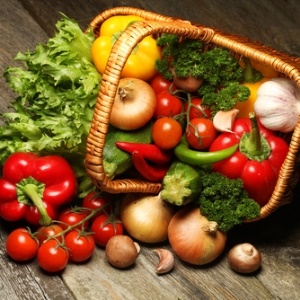
The term "organic" conjures up scenes of buzzing bees, happy cows and resplendent fruits and vegetables. Health conscious South Africans are piling their trolleys with organic food, but how much do they really know about what they are buying?
Exactly how and whether organic food is more beneficial is a hotly disputed topic. But if one looks at the basics, organic food has many benefits over non-organic food, quite simply because the crops are grown and the animals are reared naturally.
Health24's DietDoc, Dr Ingrid van Heerden explains that "The benefits of organic food are that these foods are hopefully (we have to trust the farmers on this) grown without the use of pesticides, herbicides and chemical fertilizers. Thus the difference would be that these foods are less contaminated by the above mentioned chemicals."
The benefits of organic food
- Organic farming lowers water pollution and builds soil fertility.
- By eating organic food, you cut down on the chemical load that you take in, as it contains no insecticides, pesticides, growth hormones, antibiotics, fertilisers and toxic artificial additives, flavourings, colourings and preservatives.
- The food reaches you in a natural state with its nutrient content intact.
- Organic food is often fresher than non-organic food, because it has no preservatives so it is rushed straight to the shops.
- Natural food as more flavour
The downside of organic food
- Organic produce must be thoroughly washed because it may be contaminated by improperly composted animal fertiliser.
- Organic products are also not always available. This is because organic farmers rely entirely on natural cycles. Floods, droughts and pest infestations can ruin the entire crop. Conventional farmers can artificially extend the natural seasonality of their fruits and vegetables, so that you get oranges in summer and avocado pears all year round.
Can you get organic meat?
Eighty percent of South African meat comes from animals that are either fed with feed that has been grown in artificial fertilisers and has been sprayed with pesticides, or they are reared in a feedlot or battery system where they are fed a cocktail of hormones and antibiotics.
There is a debate as to how many of these additives actually reach our plates, but organic proponents say that the potentially dangerous chemicals do not pass through the animals systems, but actually accumulate in the fatty tissue.
Animals that provide us with organic meat and dairy roam and graze freely and never receive hormones, growth promoters or antibiotics. Instead, they are only treated with homeopathic remedies.
Organic meat also lowers the risk of another outbreak of "mad cow disease" as there is less chance of organically fed and raised cattle having Bovine Spongiform Encephalitis (BSE) that can cause Creutzfeldt-Jakob disease (CJD) in humans. CJD is a rare, degenerative, invariably fatal brain disorder.
CJD came under the spotlight in the late 1980's when British farmers added recycled meat and bone meal from infected cows into cattle feed and caused an epidemic.
Why is organic food expensive?
Organic food is much more expensive because the farmers don't use artificial fertilisers, but compost and manure, no herbicides so they have to remove the weeds manually, and no pesticides so their crops may be much smaller due to losses caused by insects, moulds and microbes.
Non-organic food is also cheaper than organic food for the simple fact that conventional farming is subsidised by government and organic farming is not. So intensively farmed foods are actually paid for by you, the tax payer.
This situation arose after the severe food shortages of World War II. Governments wanted to protect their people from future famines and the new chemical technologies of the 1950s offered a solution. To encourage an abundance of food, European governments subsidised the use of chemicals in farming.
The new agro chemicals also made food far cheaper to produce and cut down the risk of farmers losing their entire crop to pests. Organic farmers however face huge risks and lower yields, which both push up the price of their products.
Organic farming is very labour intensive. On conventional farms, machines have replaced manpower, but on organic farms, human input is important.
Organic farming is also more expensive because the start-up costs and the accreditation processes are high.
What is the difference between organic and free-range?
All organic livestock are free range, but all free-range animals are not necessarily organic. "Free range" means that the animals are allowed to live natural lives. They are free to roam the fields, interact with other animals and eat a plant-based diet.
But often these free-range animals are treated using conventional veterinary methods and the plant-based food that they eat may contain artificial additives. Organic farmers use only 100% natural feed and treat their sick livestock with approved homoeopathic remedies.
How do I know if a product is organic?
The product packaging should have organic branding, an organic logo and an international accreditation stamp.
There is, at present, no legislation in place in South Africa regarding organic farming, but a new version of the Agricultural Products Standards Act 1990 (119) is in the pipeline. For this reason, farmers stick to International Organic Standards. Organic farmers from South Africa are certified by regulatory bodies that adhere to European Union requirements.
(Compiled by Birgit Ottermann, Health24, November 2010)




 Publications
Publications
 Partners
Partners














